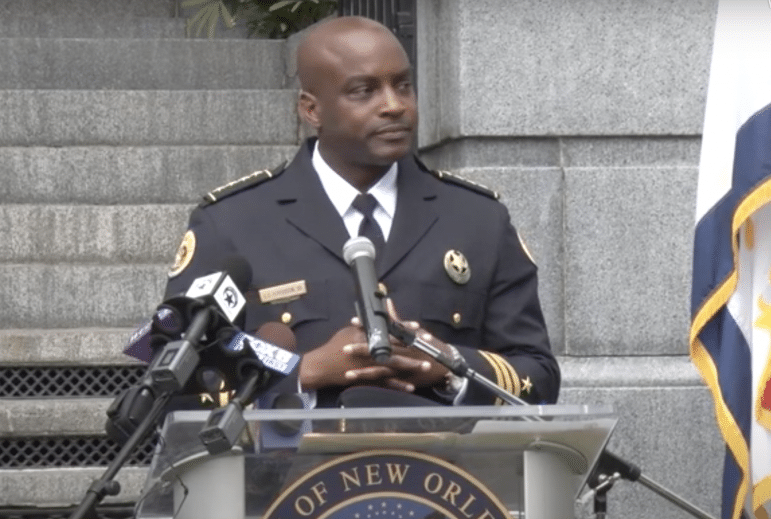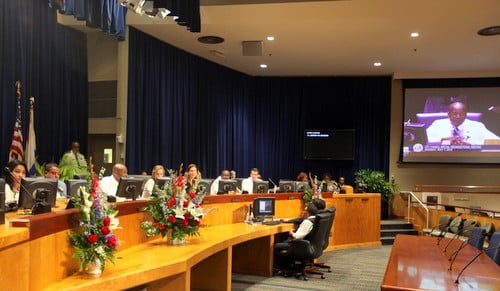
from NOPD video
NOPD Superintendent Shaun Ferguson addresses the crowd outside Gallier Hall after he is sworn in on Jan. 18, 2019. (from NOPD video)
Metropolitan Crime Commission President Rafael Goyeneche said yesterday that NOPD Superintendent Shaun D. Ferguson deserves the highest accolades for his handling of the department since the pandemic and Black Lives Matter protests began. “Chief Ferguson has been dealing with an issue that no police chief has had to deal with in 100 years,” Goyeneche said. “In the context of New Orleans, look at some of the unrest in other cities around the country. I want to give him nothing but an A as to the way things have gone here.
“New Orleans had our George Floyd awakening 15 years ago on the Danzinger Bridge. At that time our Police Department was broken, corrupt and mismanaged internally,” he said. “While protesters are calling for police reforms, all eight of their demands have been implemented for years in New Orleans. We are still under a consent decree. New Orleans is not Minneapolis.”
Goyeneche believes the NOPD still needs to improve by ensuring that policies are continually updated and that the training officers receive in the classroom is being practiced daily in the field. “New Orleans has a national reputation of having gone through tremendous reformation. We are light years ahead in terms of having solutions and reforms in place. Other police departments study what New Orleans has accomplished.” As an example, Goyeneche referenced the hiring of former Chief Michael Harrison by the city of Baltimore, which he says wanted to replicate our success.

Rafael Goyeneche
Goyeneche is optimistic about the future of the NOPD “as long as they recognize that … if they are not getting better they are getting worse.” He also praised the New Orleans Police and Justice Foundation for helping build a national recruiting platform for the NOPD. Although recruiting has gone well, the NOPD is still understaffed.
“When there is not an adequate number of officers on the force, those who are working are under a lot of stress. They start to question the support they are receiving and sometimes want to look for greener pastures closer to home,” Goyeneche said. Many NOPD officers are recruited each year from outside the region.
When New Orleanians talk about defunding the police, Goyeneche believes they don’t like some of the encounters they had with police officers years ago. From January through May 2020, the NOPD received more than 30,000 calls for service, which were handled primarily by the patrol division. Though the patrol division has 1,100 officers “on paper,” fewer than 1,000 are available for duty on any given day. Of that number, only 350 or 400 answer calls citywide, Goyeneche explained.
The high demand for service exceeds available manpower, especially when the need for community policing is included. Because officers spend almost all their time responding to calls, they are not able to engage with the community while on duty. “If we want a safer community, better outcomes happen when police interact with the public,” he said.
Continuous training is also needed. Yet when officers are in training, they are not in the field, which compromises public safety. ”No training leads to bad outcomes, litigation and dissension in the community. If we don’t have police, we will still have crime.”
While defunding police might sound good, Goyeneche said, fewer officers with less resources won’t be able to keep up with the crime we already have. Though criminal activity slowed down during the first part of the pandemic, as most people remained indoors, there were 20 homicides in April alone. Goyeneche describes these murders not as random killings but as predators seeking out their victims in crimes often related to the drug trade.
The root causes of crime are external to the NOPD and the criminal justice system, he said. “For far too long, the public has expected the criminal justice system to fix problems it can’t fix,” Goyeneche said. What’s really needed is more funding for police and additional trained professionals, both of which could be hard to come by in these tough economic times.

Council President Jason Williams speaks during a 2018 meeting in City Hall. (Robert Morris, UptownMessenger.com)
WHO WANTS TO BE NEW ORLEANS’ NEXT DISTRICT ATTORNEY?
The races for district attorney is not starting out the way City Council President Jason Williams expected. As chairman of the City Council’s Criminal Justice Committee, Williams has pounded incessantly on current DA Leon Cannizzaro, who has made several controversial decisions in recent years. Despite Criminal Court Judge Arthur Hunter’s early retirement so that he could enter the race, Williams was considered the likely victor by many members of the legal community.
With a federal indictment hanging over his head coupled with next week’s court appearance, Williams is now counting on his attorney Billy Gibbens, a seasoned former federal prosecutor, to pull a rabbit out of the hat.
The federal government has already gone to great lengths to build this case. According to published reports, they starting investigating Williams when he first entered politics almost a decade ago during President Obama’s administration. After one New Orleans U.S. attorney (possibly Kenneth Polite and not Peter Strasser) turned the case down, the government successfully recruited another prosecutor. The feds then convened a grand jury during a pandemic, which recommended a multi-count indictment. To indict an elected official who had already announced his intentions to become the city’s top prosecutor probably required special approval by the Justice Department in Washington. Though Williams and Gibbens allege that Cannizzaro is behind the indictment, court watchers aren’t buying it.
Williams is still trying to raise money, but clearly he has been damaged. Unless the government offers — and Williams accepts — some sort of plea deal, Williams is still expected to qualify on July 22 in what could become a brutal race with lots of name calling.
Cannizzaro struck back at Williams’ allegations of interference but has yet to articulate whether he will seek re-election. With qualifying three weeks away, pundits believe Cannizzaro could be contemplating retirement. Being the district attorney doesn’t seem like much fun these days. Budgets are tight and the criminal justice system is under attack from all sides. Though Cannizzaro’s support is still significant, some key community leaders might prefer a more moderate district attorney.
The indictment and Cannizzaro’s quiet demeanor could encourage new faces to jump in the race. Cannizzaro already built a decent war chest and could quickly raise any additional dollars needed. Unless self-financed, late entries might have a much tougher time with fundraising. Cannizzaro does not need to finalize his decision until 4:30 p.m. on July 24, when qualifying ends. Surely he will be polling and closely watching federal court proceedings until then.
Meanwhile Williams remains in the catbird seat on the council’s Criminal Justice Committee, which is again scheduled to meet on July 28. The Metropolitan Crime Commission’s Goyeneche believes Williams is conflicted and should recuse himself and resign as committee chairman. “It is inappropriate for Williams to use his current position as a platform to support his candidacy for another elected office. When you are under indictment for a federal crime and in fact blaming the current district attorney for your legal predicament, you should avoid any appearance of impropriety,” Goyeneche said.

Danae Columbus, opinion columnist
Danae Columbus, who has had a 30-year career in politics and public relations, offers her opinions on Thursdays. Her career includes stints at City Hall, the Dock Board and the Orleans Parish School Board and former clients such as District Attorney Leon Cannizzaro, City Councilman Jared Brossett, City Councilwoman-at-large Helena Moreno, Foster Campbell, former Lt. Gov. Jay Dardenne, former Sheriff Charles Foti and former City Councilwomen Stacy Head and Cynthia Hedge-Morrell. She is a member of the Democratic Parish Executive Committee. Columbus can be reached at swampednola@gmail.com.